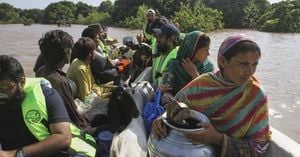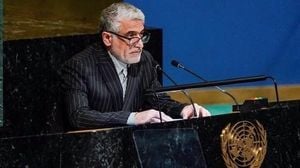California is bracing for the repercussions of devastating wildfires, with damage estimates potentially skyrocketing to $50 billion. Among the fire's victims is Karen Bagnard, who lost her home during the recent Eaton Fire. At 79 years old and visually impaired, she faced the sudden chaos of evacuation and returned to find only ruins where her beloved home once stood.
On January 7, Bagnard was unaware of the approaching disaster until her daughter informed her. Within hours, her family's home became one of the countless casualties of the fire. The wildfires ignited fierce winds, facilitating rapid destruction across neighborhoods, displacing around 60 members of older adult communities and resulting in 19 homes completely lost, according to local reports.
Recognizing the overwhelming impact of climate change and disasters, two California lawmakers have introduced legislation aimed at holding fossil fuel companies accountable for their role in such catastrophes. The Affordable Insurance and Climate Recovery Act, spearheaded by Senators Scott Wiener and Sasha Renée Pérez, would allow victims like Bagnard, as well as insurance companies, to sue for damages caused by climate-related events.
At a recent news conference, Wiener emphasized the pressing need for the fossil fuel industry to take responsibility, stating, "We are all paying for these disasters, but there is one stakeholder... the fossil fuel industry, which makes the product fueling climate change." This proposed measure aims to establish California as the first state allowing such legal actions, seeking to mitigate the financial burden on disaster victims.
The legislators argue the incidents, including wildfires and mudslides, are direct consequences of the climate change crisis spurred by oil and gas companies. Pérez voiced the frustration felt by affected communities, saying, "The reality is... the fossil fuel industry has known this for decades. Now, communities like mine are paying the price, and it’s time for Big Oil to take responsibility."
Bagnard's emotional and physical recovery from the fire is compounded by her status as one of the elderly, who are often the most vulnerable during such disasters. According to Danielle Arigoni, urban planning and community resilience expert, older individuals face unique challenges during these calamities, and their demographics must be considered when planning for climate resilience.
Public charities, such as the Foundation for Senior Services, are already mobilizing resources to support seniors, mitigating the challenges faced during evacuations and post-fire recovery. CEO Joyce Robertson highlighted the urgent need for aid, noting, "You can only [imagine] the stress for all those seniors having to evacuate." Meanwhile, community groups like Pasadena Village have stepped up to provide interim housing and other much-needed resources within these supportive networks.
While new legislation proposes more accountability for fossil fuel corporations, not all lawmakers agree on the approach. Roger Niello, Vice Chair of the Senate's Insurance Committee, expressed skepticism about the proposal, asserting the problem is more complex and multifaceted. He remarked, "This furthers the false narrative... much more complicated than this." He pointed to California's forestry management issues and budget cuts affecting fire response as equally significant factors contributing to the escalation of wildfires.
These conversations around accountability reflect larger systemic questions on disaster recovery and climate action. Insurance companies are already facing strain due to rising rates following calamities, with the bill potentially stabilizing the market by shifting some recovery costs to fossil fuel companies. Wiener added, "By forcing the fossil fuel companies driving the climate crisis to pay their fair share, we can help stabilize our insurance market and make the victims of climate disasters whole."
While legislative measures are discussed, Bagnard continues her personal recovery, seeking out resources and grappling with the loss of not only her home but her artwork, which represented years of her creative efforts. Despite the hardships, she remains hopeful about rebuilding her life, finding community support to facilitate her recovery.
California's wildfires, the resulting insurance ramifications, and the new legislative proposals have ignited discussions on climate responsibility and practical solutions aimed at ensuring support for all victims, particularly vulnerable populations like seniors. The path forward embodies not only the resilience of individuals like Bagnard but also the push for systemic changes to mitigate future disasters.



